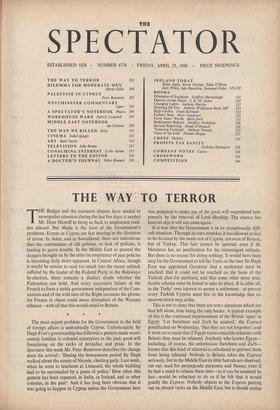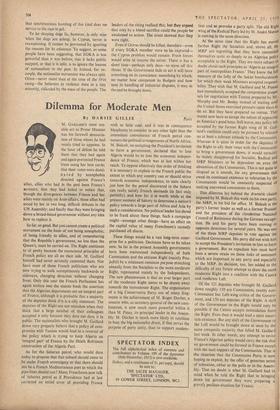THE WAY TO TERROR
THE Budget and the transport dispute have tended to monopolise attention during the last few days; it needed Mr. Dom Mintoff to bring us back to unpleasant reali- ties abroad. But Malta is the least of . the Government's problems. Events in Cyprus are fast moving in the direction of terror. In Aden, and in Somaliland, there are indications that the continuance of old policies, or lack of policies, is leading to grave trouble. In the Middle East in general the dangers brought on by the utter incompetence of past policies is becoming daily more apparent. In Central Africa, though it would be unwise to read too much into the recent setback suffered by the leader of the Federal Party in the Bulawayo by-election, there remains a distinct doubt whether the Federation can hold. And every successive failure of the French to form a stable government independent of the Com- munists and of the wild men of the Right increases the gloom; for France in chaos could mean disruption of the Western alliance—with all that this would entail to Britain.
The most urgent problem for the Government in the field of foreign affairs is undoubtedly Cyprus. Unfortunately Sir Hugh Foot's governorship has followed a pattern made weari- somely familiar in colonial enterprises in the past; good will foundering on the rocks of prejudice and pride. In the Spectator this week Mr. Peter Benenson describes. the change since his arrival: 'During the honeymoon period Sir Hugh walked about the streets of Nicosia, chatting gaily. Last week, when he went to luncheon at Limassol, the whole building had to be surrounded by a posse of police.' How often this pattern has been repeated, in India, in Ireland, and in other colonies, in the past ! And it has long been obvious that it was going to happen in Cyprus unless the Government here was prepared to make use of the good will engendered tem- porarily by the removal of Lord Harding. The chance has been let slip; it will not come again.
It is true that the Government is in an exceptionally diffi- cult situation. Through its own mistakes it has allowed policy to be dictated by the needs not of Cyprus, not even of Britain, but of Turkey. This fact cannot be ignored, even if M. Menderes has no justification for his intransigent attitude. But there is no excuse for doing nothing. It would have been easy for the Government to tell the Turks at the time Sir Hugh Foot was appointed Governor that a settlement must be reached; that it could not be reached on the basis of the Turkish plan for partition; and that some other more prac- ticable scheme must be found to take its place. It is, after all, in the Turks' own interest to secure a settlement : at present every Turkish Cypriot must live in the knowledge that to- morrow terror may strike.
This is not to deny that there are some situations which are best left alone, time being the only healer. A typical example of this is the continued imprisonment of the British 'spies' in Egypt. 'Let Swinburn and Zarb be assured,' the Express pontificated on Wednesday, 'that they are not forgotten'; and it went on to insist that if Egypt wants amicable relations with Britain they must be released. Anybody who knows Egypt— including, of course, the unfortunate Swinburn and Zarb— knows that this kind of editorial is calculated to prevent them from being released. Nobody in Britain takes the Express seriously, but in the Middle East its little hatreds are observed, cut out, used for propaganda purposes; and Nasser, even if he had a mind to release these men—as it can be assumed he has—would be reluctant to do so if he felt that it would gratify the Express. Nobody objects to the Express putting out its absurd views on the Middle East; but it should realise
that sanctimonious humbug of this kind does no service to the men in jail.
To let sleeping dogs lie, however, is only wise when the dogs are asleep. In Cyprus, terror is reawakening. It cannot be prevented by ignoring the reasons for its existence. To suggest, as some people have been suggesting, that EOKA is less powerful than it was before, that it lacks public support, or that it is split, is to ignore the lessons of nationalism in the past. In Ireland, for ex- ample, the nationalist movement was always split. Often—never more than at the time of the 1916 rising—the believers in violence were in a tiny minority, ridiculed by the mass of the people. The leaders of the rising realised this; but they argued that only by a blood sacrifice could the people be awakened to action. The event showed that they were right.
Even if Grivas should be killed, therefore—even if every EOKA member were to be captured— the Cyprus problem would remain. Fresh forces would arise to resume the terror. There is but a short time—perhaps only days—to stave off this threat. If the Government fails to act it will have something on its conscience; something by which, no matter how competent its Budgets and how sane its handling of industrial disputes, it may in the end be brought down.















































 Previous page
Previous page